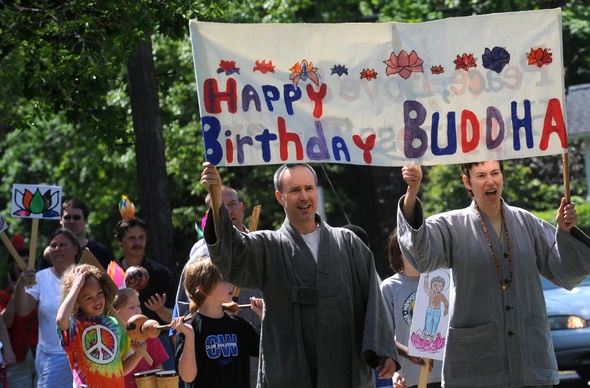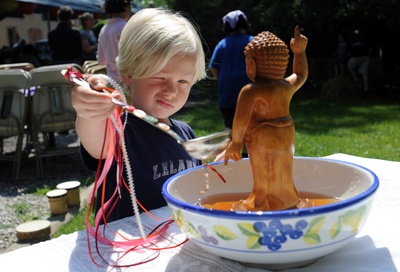Zen Buddhist Temple celebrates Buddha's 2,554th birthday

"Kuhaeng" Richard Gaeth, left, and "Tongsan" Catherine Brown hold a banner as they lead a parade in honor of Buddha's birthday in front of the Zen Buddhist Temple on Packard Street on Sunday.
Melanie Maxwell | AnnArbor.com
On the full moon of the fourth month in the year 544 B.C., Siddhartha Gautama Buddha was born. According to the Mahayana Buddhist lunar calendar, this May marked his 2,554th birthday.
The Zen Buddhist Temple at 1214 Packard St. celebrated the birth of Buddha this past weekend. Each year, the temple hosts a two-day celebration.
The events started on Saturday with a friendship-themed poetry reading. For dinner the temple presented a vegetarian buffet, a feast prepared by residents of the temple with food donated by local restaurants including Whole Foods Market, Dynasty Buffet, Earthen Jar, Afternoon Delight, Tuptim Thai Cuisine and Starbucks. “The temple has the best food in all of Ann Arbor tonight,” said Robert Rhodes, who was visiting with his wife, Nancy.
After dinner the "sangha," or members of the temple, gathered to hear storyteller Yvonne Healy. Her first story was about Cuba and the value of speaking another language. Her second story was called “The Golden blackbird." Joe Reilly concluded the night by singing four songs.
The temple had a special service in honor of Buddha’s birth on Sunday morning. The sangha participated in the bathing of the baby Buddha, a tradition unique to Buddha’s birth celebration. Each member is given the opportunity to bathe the Buddha in a bath of sweet tea to symbolize their respect, gratitude and appreciation for his teachings and traditions. The bath also symbolizes taking care of the Buddha nature within one’s self in order to cultivate one’s ability to rise above suffering, ultimately to achieve enlightenment.Â
“When the Buddha was born, it pointed down and up. Then he said, 'In this life I will awaken,’ ” explained the Resident Priest Haju Sunim.
“When the Buddha was dying, the people said, ‘Oh, you have taught in so many places. How are we to remember the important places where you taught?’ He said, ‘You should remember where I was born, where I was enlightened, where I began to teach and where I died. Those four parts of life.’ So, most Buddhist groups around the world have some sort of commemoration of those four events in the Buddha’s life at some time in the year.”Â
Other elements of the service are practiced weekly, including the chanting of the "three refuges" (sentiments where Buddhists can find guidance), a scripture reading (often from the Dhammapada), and a Dharma talk from Sunim (exemplifying a Buddhist’s utmost vow and dedication to celebrate the Buddha with every being).

Four-and-a-half year-old Finn Bassett-Kennedy uses a ladle to bathe a Buddha statue with tea as party of a birthday ceremony at the Zen Buddhist Temple on Packard Street on Sunday.
Melanie Maxwell | AnnArbor.com
Tilman Borgers and Spasia Poncher received their precepts
The service concluded by singing “happy birthday” to Buddha - led by Jacob Lachance on the saxophone - and a vow to celebrate Buddha’s birthday every day. The sangha then joined together to march in a "Peace & Happiness" parade. While chanting “peace, love and happiness to all,” they carried signs, noise makers and wore lantern-inspired hats down Packard.
Sunday afternoon was devoted to Buddhist teachings. The temple presented "the art of mindful communication" that explored Buddhist’s six livelihood guidelines. In addition, an introduction to Zen meditation was available to the public.
A Lotus lantern lighting and chanting service ended the weekend celebration. Sunim explained the importance of the lanterns at the birth celebration: “Some of the Buddha’s last words were ‘Be a lamp unto yourself, rely on yourselves and do not rely on external help. Hold fast to the truth as a lamp,’ so people make lanterns” to remember his teachings."
Each lantern was given a dedication then lit as the chanting commenced. The biggest lantern at the Zen temple was dedicated to the earth. Its dedication was compiled randomly by the sangha congregation and read, “World unite, May the earth be healthy and may we be mindful with our use of resources, may we clean up our act, be nice to animals, be grateful, kale to the victors, for this earth belongs to our children. May it be so.”
The Zen Buddhist Temple of Ann Arbor is a mission of the Buddhist Society for Compassionate Wisdom. The society was founded by Samu Sunim in 1967. It is a Korean-born Mahayana branch of Buddhism.Â
Currently there are five other missions throughout the United States and Canada. The temple offers introductory meditation courses, two annual Zen retreats, yoga workshops for all levels and an annual Peace Camp.
Katherine Axelsen is a senior at the University of Michigan double majoring in English and Comparative Religion. She covers U-M campus, Faith and neighborhood stories for AnnArbor.com. For further questions, email her at kaxe@umich.edu.

